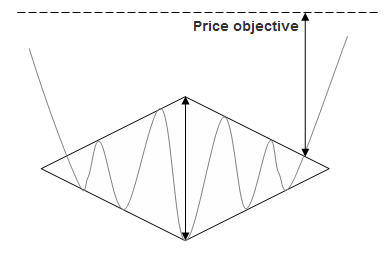Chart pattern: Diamond bottom
- 19834
- 2
- 0
What is a diamond bottom?
A diamond bottom is a bullish, trend reversal, chart pattern.
A diamond bottom is formed by two juxtaposed symmetrical triangles, so forming a diamond.
A diamond bottom has to be preceded by a bearish trend. This pattern marks the exhaustion of the selling current and investor indecision.
Volatility and oscillations increase in the first half of the pattern (i.e. in the symmetric broadening wedge pattern); then decrease in the second half of the pattern (i.e. in the symmetric triangle).
A diamond bottom’s price objective is calculated by plotting the maximum height of the diamond at the exit point.
In general, the exit movement is as fast as the downward movement that preceded it.
Graphical representation of a diamond bottom

Statistics of diamond bottoms
- In 82% of cases, the output of a diamond bottom is bullish.
- In 79% of cases, the price objective of a diamond bottom is reached.
- After exit, in 43% of cases, the price makes a pullback in support on the resistance line of the symmetrical triangle (2nd half of the diamond).
Notes on diamond bottom
- Diamond tops appear 3 times more often than diamond bottoms.
- Sometimes the price line forms an inverse head and shoulders within the diamond bottom.
- A diamond bottom pattern is very difficult to spot, and often forgotten by traders.
- The first half of a diamond bottom is a symmetrical broadening wedge pattern (continuation pattern) while the diamond bottom (the 2 halves together) is a reversal pattern.
For your information: A diamond bottom is a reversal chart pattern. Its opposite is a diamond top.
About author
- 5
- 1
- 0
- 4


